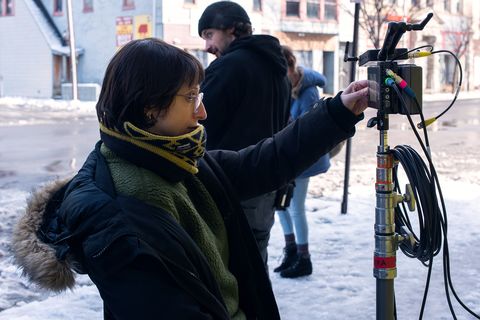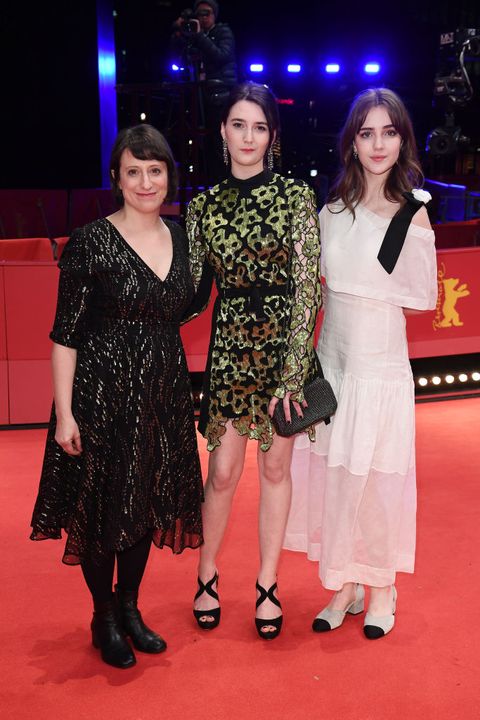Eliza Hittman has an affinity for the taboo. Her films confront how young people navigate impending adulthood: 2013’s It Felt Like Love follows a 14-year-old pursuing an older, more experienced boy with dangerous consequences, while 2015’s Beach Rats focuses on a 19-year-old Coney Island drug dealer exploring his sexual identity as a webcam boy for older men. But her newest feature, Never Rarely Sometimes Always, masters the coming-of-age narrative, turning the political into the heartbreaking personal journey of a 17-year-old seeking out an abortion.
Shot in 27 days, the spare indie takes on Autumn (wonderfully played by newcomer Sidney Flanigan), an angsty high schooler from an isolated Pennsylvania town who discovers she’s pregnant. With her equally inexperienced cousin Skylar along for support, Autumn takes a bus to New York City to avoid her home state’s strict parental-consent abortion laws. The teens bounce between Midtown’s Port Authority to Planned Parenthood clinics in Brooklyn and Manhattan, running out of money, options, and a safe place to spend the nights. Hittman’s film, which won the Silver Bear Grand Jury Prize at the Berlin Film Festival earlier this year, is a sobering reminder of the importance of sexual autonomy, the right to choose, and what happens when those rights are slowly stripped away.
Hittman sat down with ELLE.com to talk about the inspiration for this poignant film, demystifying what happens behind Planned Parenthood’s walls onscreen, and how Autumn’s plight across state lines will become a reality for many women if Roe v. Wade gets overturned.
Films that tackle such pressing, personal issues are often sparked by a news story. Was that the case here?
Yes. A long time ago I read an article about a 22-year-old woman from Ireland who had to travel all the way to London to get an abortion [before the country legalized the procedure in 2018]. From there, I got lost in a rabbit hole of educating myself and trying to understand the politics of abortion. I couldn’t shake this image of a woman on the run who couldn’t afford that journey, but how much persistence and bravery it took for her to undergo it, and the pain of having to do it in secret and alone.
From the way the town is shot to Autumn’s interactions inside Planned Parenthood, the film feels incredibly authentic. Can you talk about the research process?
I wanted the story to be as credible as possible, so I did a lot of fieldwork and met with doctors, abortion providers, and people from Planned Parenthood. I was really privileged to be allowed in those spaces to talk about what they do, how they help women, and the furthest people traveled to the clinic in New York. A lot of the story was inspired by those conversations.
I was also interested in the state restrictions that try to make it impossible for women to get abortions. I took a car and drove into Pennsylvania and went back in time, to this coal-mining region with no public transportation that felt completely cut off from any major city. I wanted the story to take place there, but in my storytelling, I didn’t want to be leering at this town, turning the camera on how poor it was and judging it. It’s about creating the tone of the place more than showing the audience how impoverished these places are.
I love the connection between Autumn and Skylar—they have a bond that defies words. The second Skylar finds out Autumn is pregnant, she’s already set the plan in motion without saying a word. How did you build that out on the page?
Part of the writing process was about writing things that didn’t work. It felt extremely wrong to write a scene where Autumn is like, “I’m pregnant,” or one where she goes into why. My compass kept telling me, don’t have them talk about these things, because it feels cheap. I took a risk, trusting that they could communicate in a subtle way because they are cousins and have that connection. Also, a lot of my work explores taboos and things that are difficult to talk about.
As director, how did you help create that bond between Sydney and Talia?
I only had a day to rehearse with them, so we met at my apartment and had a day of hanging out and bonding. I gave each a marble notebook where I wrote very personal prompts for them to respond to. Some things were light, like, “describe your happiest childhood vacation,” while some were very personal. Both have complicated relationships with their fathers, so I asked them to write about the last time they saw their fathers, and then I left them to share what they had written just with each other. It was really important for them to have this secret history off-set.
As an adult watching, some of their decisions scared me! Like, please don’t go off with that strange boy! Where did those moments of realism come from?
You come up with internal logic for the script. I pushed the boundaries on what they would do and say. Also, they don’t get mugged, they don’t get raped, and it’s not Thelma and Louise. It’s about micro-obstacles and how they navigate them. It was really important to put the audience in their shoes and feel the tension of them navigating this misogynistic and hostile world that reflects the way this country treats us in real life.
The film does an effective job of demystifying the process of getting an abortion, from anti-abortion crisis centers to the reality of the Planned Parenthood process. Why was that important?
First, because what Planned Parenthood is doing isn’t sinister. I also believe that the portrayal was balanced and honest, and not in a way that intimidates women from going through it. In terms of those centers, I didn’t want to vilify them either. I visited one and took a pregnancy test, went through counseling sessions, and got those same pamphlets on “Father’s Rights” that Autumn gets.
The scene where Autumn goes through the Planned Parenthood counseling session that determines intimate partner violence is gutting. Where did the idea for this scene come from?
In doing the research I talked to a lot of people, including [clinical psychologist] Kelly Chapman from Queens’ Choices Women’s Medical Center. She said something really poignant to me: “Eliza, the abortion is never the crisis. It’s the mystery of what’s going on at home that you can’t fix in 20 minutes.” I worked that into the story because pregnancy, sexual health, intimate partner violence, [and] accessing safety [from abusive relationships] are all intertwined.
The ending is especially hard because on one hand you’re relieved for Autumn, but then you remember what’s waiting for her at home. Why was it important to not wrap up everything nicely?
I think as the film connects to the #MeToo Movement, a lot of women feel powerless, even after coming forward. This ending is complicated and it felt more true to life. At that moment when she’s on the bus going home, you have feelings of peacefulness, and she finally falls asleep. But at the same time, she’s going home to all of these other issues. I believe the end of a movie is the beginning of another one.
What do you hope viewers take away from Never Rarely Sometimes Always?
The timing of the movie brings about some uncomfortable feelings with the current Supreme Court case around abortion rights [in Louisiana]. The unfortunate journey depicted in this film will become a journey other women will have to take should Roe v. Wade be gutted.


